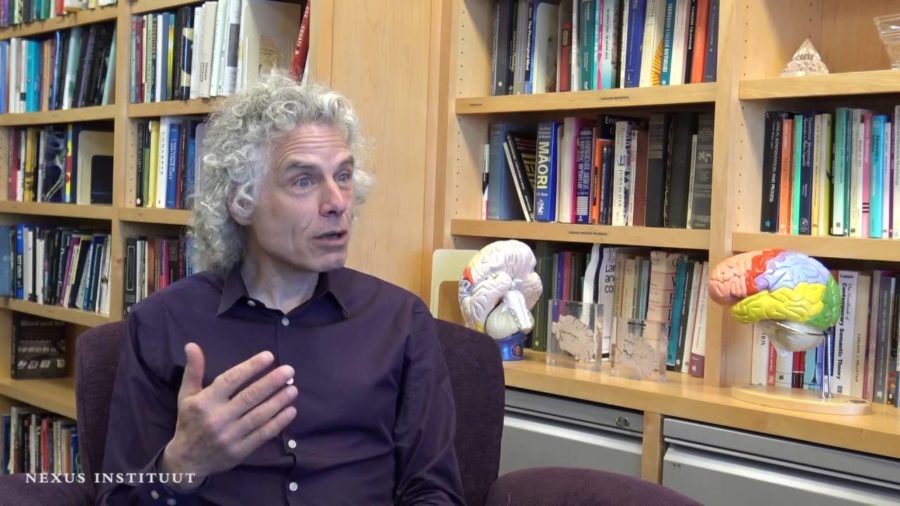Rob Riemen: Steve Pinker, thanks making time to meet you here at Harvard, still the best university in the world. Can you tell a little bit more about the interest of your scholarly work? What is it that you’re working on and why?
Steven Pinker: I’m interested in human nature, and fortunately that covers many topics. I have written on everything from how to write well, to why languages have irregular verbs, to the historical trends in war, peace, murder, and genocide, to visual cognition—how we form mental images, how we recognize shapes and faces. And one of the great advantages of being a psychologist is that you can write about all of these topics because they all have to do with human nature.
Riemen: And do you think that because you know, there are a few other fields like philosophers or theologians, who claim also to know everything. What’s the difference?
Pinker: Well, philosophy is very much related to psychology, and of course it was philosophers who first raised questions about the nature of human nature. I don’t think there’s a sharp division between the field of philosophy and the field of psychology. There are philosophical questions and psychological question. Philosophical questions about the nature of ideas, how they’re logically related to each other. Psychological questions are more empirical. How does the human brain come to think certain kinds of thoughts and have certain kinds of values. But in my experience, they’ve all been closely related.
Riemen: You have been so extremely kind to accept our invitation to be one of the speakers of the Nexus Conference on November 12, “What Will Save the World?” You’re world-famous, you’re very much in demand, you’re an extremely busy man. Why did you accept the invitation to come to Amsterdam, make time, and to be present and speak at that conference?
Pinker: Well, I like big questions, and there could be no bigger question that will save the world. I don’t think that anything will save the world in the sense of bringing Utopia to Earth. But I think the world could be improved, and that would be the version of the question that I’m very much interested in. Because I think the world has improved, and can improve further.
Riemen: One of the most famous people in the world of psychology, Sigmund Freud, was I guess much less optimistic. If I understand him well, he was especially interested in the question, “Why are things going wrong all the time?” We will also have religious people, and probably they will say, “Well, it goes wrong because there’s something like original sin.” On a secular level, Freud will point at the dark side of human nature. Why do you think it’s going wrong so often?
Pinker: Yes. Well, like Freud I do believe that human nature has a dark side. I believe that being a member of a civilized society involves compromises and discontents, as Freud so famously put it. I think that aspects of human nature inevitably come into conflict with the aspects of human nature in other people. I don’t think that men and women want exactly the same thing. I don’t think that parents and children want exactly the same thing. Even close friends don’t always want the same thing. There’s always tension, there’s always conflicts of interest. That’s why there’s great literature; that’s why there’s tragedy.
On the other hand, one component of human nature is the ability to pose and solve problems, and to communicate our solutions to other people via language. Thanks to writing, we can accumulate good ideas. We can try out ways of improving human life, keep the ones that work, discard the ones that don’t work. Learn from our mistakes, learn from our tragedies. And bit by bit, figure out ways in which we can minimize the effect of human conflict. And I think the data show that we’ve been doing it.
Another reason that Freud was so pessimistic is that he was situated in one of the worst times of human history, the years following the First World War, which he lived through, and immediately preceding the Second World War. He lived to see the Anschluss. His daughter was arrested by the Nazis. He escaped from the Nazis just in time to spend the last year of his life in London. And so he saw the clouds gathering for one of the worst interludes in human history, the Second World War.
And indeed, if the world that Freud lived in had continued, none of us should be an optimist, because those were dark days indeed. And of course there were predictions after the Second World War that the two world wars were just the beginning of an escalating series. World War III was inevitable. It would be even worse because of nuclear weapons.
We are now more than seventy years after the end of World War II and World War III did not happen. No nuclear weapon has been used since Nagasaki. The world has become more democratic, more affluent, more free, more peaceful, in these seventy years. That’s no guarantee that it will continue. No one can prophecy the future. I don’t have the gift of clairvoyance to be able to see into the future. But it shows that the kind of doom that many intellectuals felt after World War II is not inevitable. There are actions that we can take that reduce the risks, and fortunately we have been taking— [recording cuts short]
Further Reference
Nexus Conference 2016, “What Will Save the World?”
